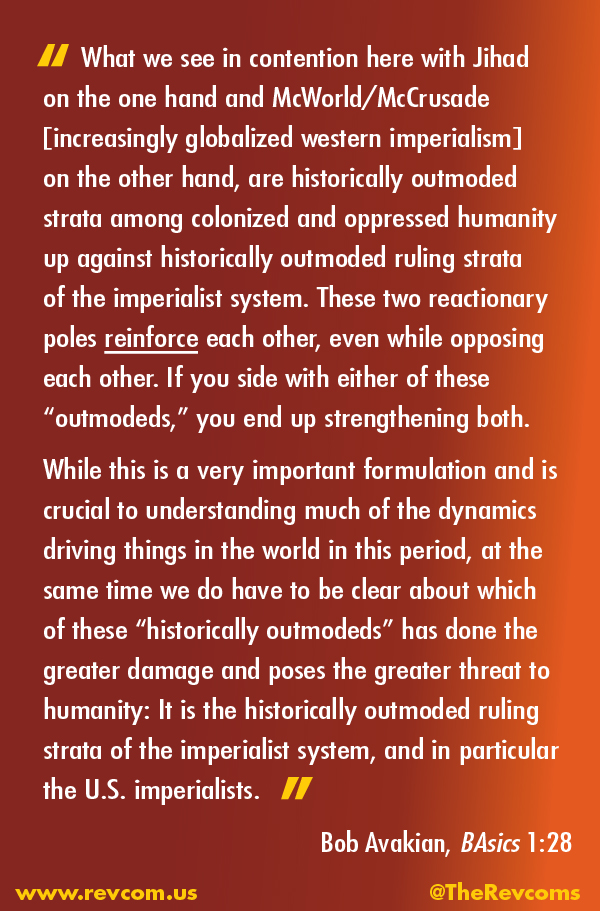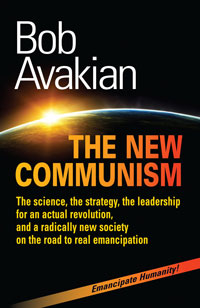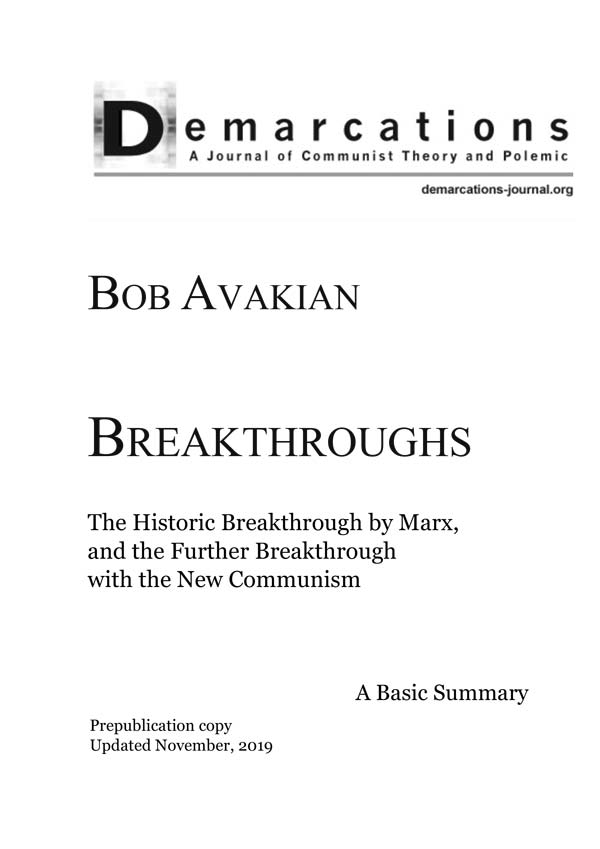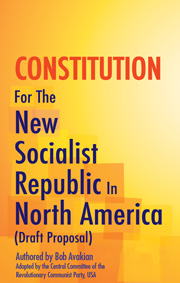Mass Outpourings Worldwide… and What Is to Be Done
| revcom.us
Outpourings of mass sustained protests against governments in countries all over the world have been a feature of the past decade, but have increased in intensity and scope in the past few years—South Korea, Puerto Rico (U.S.), Lebanon, Chile, now Iraq, to name just a few... and the list grows almost every week. There is much to learn from what are overall positive examples and their dynamics, especially for the #OutNow struggle that seeks to oust this fascist Trump/Pence regime from power through sustained nonviolent mass mobilization.
These mass outpourings and upsurges are the result of and reflect deep contradictions in diverse societies, with many differences and variations. While many of these mass movements reflect a positive development, they have to be analyzed in the concrete for the content and nature of the upsurges and their programs. There are different origins or triggering events, some arising out of economic struggle or drastic measures by government, giving rise to severe hardships; some out of political crises of one kind or another, often with questions of the environment, with cultural/ethnic/religious conflict mixed in—all in the context of the overall workings of the capitalist-imperialist system, and the different histories and ways in how that affects the people in these countries. The overall character of the upsurges is going to be different in each instance, including the role of different ruling classes who see their interests tied to the outcome of the struggle.
Inevitably in these kinds of situations, whatever was the initiating factor, different kinds of class forces are involved—from radical-progressive to bourgeois-(democratic)-imperialist to reactionary-fascist forces and all stripes in between—and they each fight for how they view their interests, often in masked form. Imperialist powers get involved directly or through local actors to influence outcomes that serve their geopolitical interests.
Let’s take Hong Kong as an example. This protracted uprising does involve a just struggle of the people against reactionary laws and restrictions being imposed on them by the Chinese government in Beijing—part of the overall trend of undermining the autonomy of Hong Kong step by step since its reabsorption into China. This struggle has drawn in and been sustained by students and basic masses, broad middle strata, but also significant sections of local ruling figures of the Hong Kong business and political elite who perceive their position, democratic rights, and relative autonomy existentially threatened by the Chinese government’s acts and laws. However, the U.S.’s statements (including the recent bill passed by Trump and the Congress1) supporting the protests are very bound up with this regime’s growing global contention and competition with China. There is complexity to that situation as well, given the particular history of Hong Kong as a former British colony—where British imperialism is an actor behind the scenes, working closely with the U.S. Another factor is the complex character of the movement for “democracy” there against what most see as “communist” China, which is communist “in name” but capitalist in content and essence (China was a genuinely socialist society under the leadership of Mao Zedong, and an inspiring beacon for the world revolution, but has ceased being so since his death in 1976 followed by the restoration of capitalism in China.)2
Several Latin American countries have also witnessed mass protests, but the character of the opposition is different in each of them. For example, the hand of U.S. imperialism is very involved in fomenting and shaping a rebellion against the current government in Venezuela, after the Bolivarian/Chávista experiment that was supposed to benefit the poor has run up against limitations,3 especially as Venezuela’s oil-export earnings have dropped with falling oil prices. In Bolivia, a government that came to power as part of a movement to bring the indigenous majority population into political power, with the presidency of Evo Morales, has run up against its limitations. This has created a situation where reactionary forces identified with the previous order have come to the fore. In both Venezuela under Chávez and Bolivia under Morales, the popular movements that were brought forward did not fundamentally break with the whole imperialist domination of these countries or unleash radical social transformation. These upsurges are marked by dominant reactionary currents involving other sections of the ruling class elites (mostly pro-U.S.), middle strata, and even basic masses. In contrast, in Colombia, the mass protests are targeting forces in the government that are more directly linked to pro-U.S. positions, and a very repressive regime.
The mass upsurges in the Middle East occur in a context shaped by the struggle between the “two historically outmoded”4 forces of American-led imperialism and Islamic fundamentalism, religious conflicts such as between Shia-Sunni, the liberation struggles of nationalities historically oppressed like the Kurds, all intertwined with overall imperialist domination and its geopolitical rivalries, with local powers seeking to exert their influence in this context. The U.S. and other imperialists have played a major role in fomenting many of the crises underlying the mass upsurges. The U.S. has been waging unjust wars and military actions for empire, and instituting harsh sanctions as economic warfare to impose their will on some of these Middle Eastern regimes, as is the case now with Iran.
The growth of these mass upsurges is an expression of the fact that we are at a point in history in which multiple crises are heightening, like global warming and vast gulfs of inequality, and the previous order is straining against its limits, in many cases not holding. The decisive question that is up globally is whether there will be a revolutionary trend within them that does the necessary work to transform those struggles into actual revolutions—the overthrow of the reactionary system through revolutionary war, as part of going for a whole new world—OR whether humanity will be consigned to even more grotesque forms of misery, oppression, and alienation and perhaps even extinction. Those are the choices, and those, nothing less, are the stakes.
As Bob Avakian said on the occasion of the Arab Spring in Egypt, in “EGYPT 2011: MILLIONS HAVE HEROICALLY STOOD UP... THE FUTURE REMAINS TO BE WRITTEN”:
When people in their masses, in their millions, finally break free of the constraints that have kept them from rising up against their oppressors and tormentors, then whether or not their heroic struggle and sacrifice will really lead to a fundamental change, moving toward the abolition of all exploitation and oppression, depends on whether or not there is a leadership, communist leadership, that has the necessary scientific understanding and method, and on that basis can develop the necessary strategic approach and the influence and organized ties among growing numbers of the people, in order to lead the uprising of the people, through all the twists and turns, to the goal of a real, revolutionary transformation of society, in accordance with the fundamental interests of the people.
And, in turn, when people massively break with the “normal routine” and the tightly woven chains of oppressive relations in which they are usually entrapped and by which they are heavily weighed down—when they break through and rise up in their millions—that is a crucial time for communist organization to further develop its ties with those masses, strengthening its ranks and its ability to lead.
Or, if such communist organization does not yet exist, or exists only in isolated fragments, this is a crucial time for communist organization to be forged and developed, to take up the challenge of studying and applying communist theory, in a living way, in the midst of this tumultuous situation, and to strive to continually develop ties with, to influence and to ultimately lead growing numbers of the masses in the direction of the revolution that represents their fundamental and highest interests, the communist revolution.
In light of this, we are drawing attention to the statements from two different revolutionary communist organizations that are working to bring forward and advance such a force—from the Communist Party of Iran (Marxist Leninist Maoist) and the Grupo Comunista Revolucionario (Revolutionary Communist Group) of Colombia. In speaking to the immediate crises in their respective countries and support for the people standing up, they are bringing forward the need for a thoroughgoing revolution against the system itself. Revolutionaries everywhere should give support not only to the just struggle of the people where they are standing up against oppressive regimes. But of great importance is giving support to those forces who are stepping up to the task of fighting for a communist-led revolution, and a whole different and better world in their respective countries but as part of the worldwide struggle to emancipate all of humanity.
1. The “Hong Kong Human Rights and Democracy Act,” passed by unanimous consent in the U.S. Senate and by a large majority in the House, was signed by Trump on November 27. [back]
2. For a full analysis, see You Don’t Know What You Think You “Know” About... The Communist Revolution and the REAL Path to Emancipation: Its History and Our Future. Interview with Raymond Lotta. [back]
3. See “Hugo Chavez Has an Oil Strategy... But Can This Lead to Liberation?” by Raymond Lotta. [back]
4. From Bob Avakian:
What we see in contention here with Jihad [Islamic fundamentalism] on the one hand and McWorld/McCrusade [increasingly globalized western imperialism] on the other hand, are historically outmoded strata among colonized and oppressed humanity up against historically outmoded ruling strata of the imperialist system. These two reactionary poles reinforce each other, even while opposing each other. If you side with either of these “outmodeds,” you end up strengthening both.
While this is a very important formulation and is crucial to understanding much of the dynamics driving things in the world in this period, at the same time we do have to be clear about which of these “historically outmodeds” has done the greater damage and poses the greater threat to humanity: It is the historically outmoded ruling strata of the imperialist system, and in particular the U.S. imperialists.
BAsics 1:28 [back]
EGYPT 2011: MILLIONS HAVE HEROICALLY STOOD UP... THE FUTURE REMAINS TO BE WRITTEN
A Statement By Bob Avakian, Chairman of the Revolutionary Communist Party, USA
February 11, 2011
Millions of Egyptian people from all walks of life, drawing inspiration from the people of Tunisia, have heroically risen up, defied the hated regime of Hosni Mubarak and forced Mubarak to resign. This has shattered the notion that "things can never change." It is a powerful demonstration that there is no permanent necessity to the existing conditions under which the great majority of humanity suffer so terribly. Oppressed people and people who hunger for an end to oppression, in every country all over the world, have deeply shared in the joy and hope of these massive uprisings. And the stirrings of revolt continue to spread.
“There is an urgent need for this new synthesis to be taken up, broadly, in this society and in the world as a whole: everywhere people are questioning why things are the way they are, and whether a different world is possible; everywhere people are talking about ‘revolution’ but have no real understanding of what revolution means, no scientific approach to analyzing and dealing with what they are up against and what needs to be done; everywhere people are rising up in rebellion but are hemmed in, let down and left to the mercy of murderous oppressors, or misled onto paths which only reinforce, often with barbaric brutality, the enslaving chains of tradition; everywhere people need a way out of their desperate conditions, but do not see the source of their suffering and the path forward out of the darkness.”
from the Six Resolutions of the Central Committee of the Revolutionary Communist Party, USA
Special Issue of Demarcations
This special issue features the prepublication version of Bob Avakian’s historic work, BREAKTHROUGHS: The Historic Breakthrough by Marx, and the Further Breakthrough with the New Communism. A Basic Summary in multiple languages—English, Spanish, Farsi, Portuguese, German, and Turkish. The latter two are partial, and works in progress.


Get a free email subscription to revcom.us:



